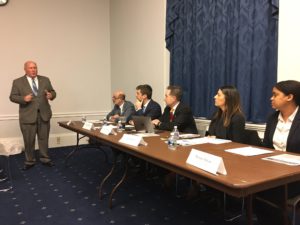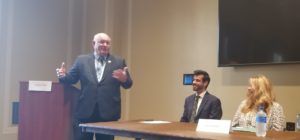This week marks the formal start of Career and Technical Education (CTE) Month® which lawmakers have started to formally recognize on Capitol Hill. Elsewhere appropriations leaders continue to negotiate full-year funding for the current fiscal year.
Congress Continues to Negotiate FY24 Budget
 This week, appropriations leaders continued negotiations on federal fiscal year 2024 (FY24) funding for the U.S. Department of Education and other agencies. As shared previously, lawmakers recently extended federal funding on another short-term basis through March 1 and March 8 of this year to allow more time for negotiations on this critical issue. Lawmakers have reportedly come to an agreement on allocations for each of the dozen spending bills that compose the federal budget, known as 302(b) allocations. This includes the Labor-HHS-ED appropriations bill which provides funding for the Carl D. Perkins Career and Technical Education Act’s (Perkins V) state grant program along with other important federal investments in education and workforce development.
This week, appropriations leaders continued negotiations on federal fiscal year 2024 (FY24) funding for the U.S. Department of Education and other agencies. As shared previously, lawmakers recently extended federal funding on another short-term basis through March 1 and March 8 of this year to allow more time for negotiations on this critical issue. Lawmakers have reportedly come to an agreement on allocations for each of the dozen spending bills that compose the federal budget, known as 302(b) allocations. This includes the Labor-HHS-ED appropriations bill which provides funding for the Carl D. Perkins Career and Technical Education Act’s (Perkins V) state grant program along with other important federal investments in education and workforce development.
While the specific allocations have not yet been made public, this agreement represents a critical next step in the wider FY24 process and is an indication that these discussions are progressing toward an expected resolution ahead of the upcoming funding deadlines in early March. As these efforts continue to take shape, Advance CTE and partners are continuing to advocate for a strengthened investment in Perkins V’s formula grant program.
CTE Month Kicks-Off
Yesterday, House CTE Caucus co-chairs Representatives Glenn “GT” Thompson (R-PA) and Suzanne Bonamici (D-OR) formally introduced a Congressional resolution recognizing February as CTE month. “We are pleased to support the 2024 Career Technical Education Month resolution as a celebration of CTE’s contributions to our learners and communities, and applaud the leadership of the House CTE Caucus, led by Representatives Thompson and Bonamici, to highlight CTE’s central role in advancing economic opportunity for every learner across the nation,” Advance CTE’s Executive Director, Kate Kreamer, said upon introduction. The House caucus is currently circulating this resolution for additional support. Be sure to ask your representative to co-sponsor this year’s CTE month resolution.
 In addition, co-chairs of the Senate CTE Caucus led by Senators Tim Kaine (D-VA), R. Michael Young (R-IN), Tammy Baldwin (D-WI) and Ted Budd (R-NC) are leading a similar CTE Month resolution in the chamber. More information on the status of this resolution can be found here with our partners at the Association for Career and Technical Education (ACTE). Be sure to encourage your senators to support this effort if they have not done so already!
In addition, co-chairs of the Senate CTE Caucus led by Senators Tim Kaine (D-VA), R. Michael Young (R-IN), Tammy Baldwin (D-WI) and Ted Budd (R-NC) are leading a similar CTE Month resolution in the chamber. More information on the status of this resolution can be found here with our partners at the Association for Career and Technical Education (ACTE). Be sure to encourage your senators to support this effort if they have not done so already!
Steve Voytek, Policy Advisor


 On Wednesday, November 20, the Congressional Career and Technical Education (CTE) Caucus held a briefing on
On Wednesday, November 20, the Congressional Career and Technical Education (CTE) Caucus held a briefing on  What can state leaders do to expand access to high-quality career technical education (CTE) in rural communities? That was the focus of an event held last Thursday by the Congressional CTE Caucus, in coordination with Advance CTE.
What can state leaders do to expand access to high-quality career technical education (CTE) in rural communities? That was the focus of an event held last Thursday by the Congressional CTE Caucus, in coordination with Advance CTE.  How can state and local leaders tackle these challenges? During the event, Dr. Marcie Mack — state CTE director for Oklahoma, spoke about
How can state and local leaders tackle these challenges? During the event, Dr. Marcie Mack — state CTE director for Oklahoma, spoke about  Jan Hanlon, executive director for the Mountain State Education Service Cooperative, discussed how West Virginia is tackling access challenges through Simulated Workplace programs. Through Simulated Workplace, more than
Jan Hanlon, executive director for the Mountain State Education Service Cooperative, discussed how West Virginia is tackling access challenges through Simulated Workplace programs. Through Simulated Workplace, more than